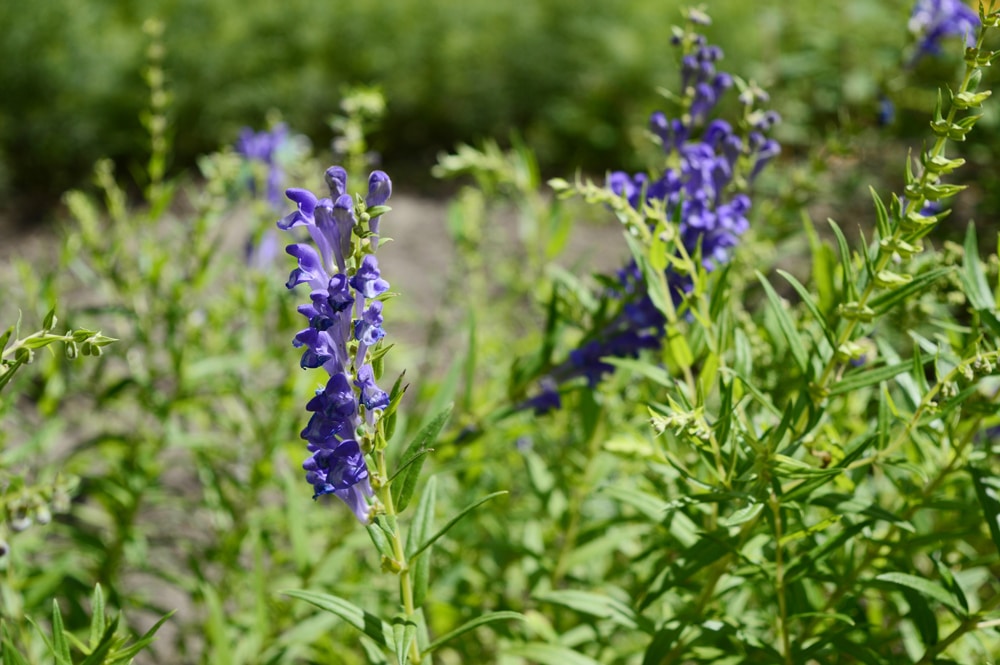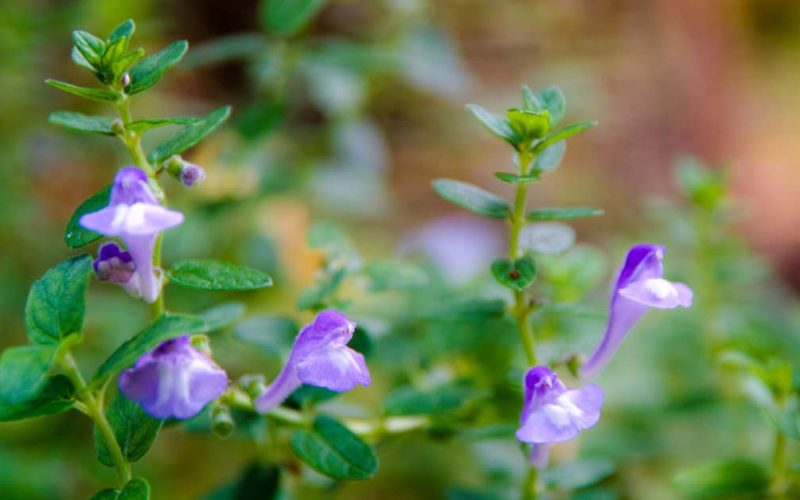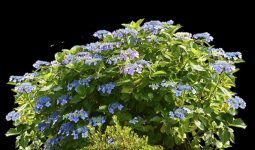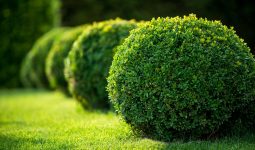Skullcap is a name you’ve probably heard at the saloon before, but that isn’t what this post is about. Skullcap, also spelled as skullcap is the general name for Scutellaria, which is a genus of flowering plants belonging to the mint family.
The name of this plant is derived from scutella, a Latin word which means “little dish,”. The reason for choosing such a name is pretty obvious as the little flowers of these plants come with a helmet or dish-like shape. However, one must not mistake Skullcap with death caps, which are a mushroom known to be highly poisonous.
The skullcap plant is known to be highly medicinal as its different parts ( roots and leaves inclusive) have been used as active ingredients in Native American and traditional Chinese medicine for the treatment of a broad range of illnesses like chronic pains and diarrhoea.
Today, this medicinal plant is widely available in the form of supplement and purported to offer an array of medical benefits, from relieving anxiety and boosting heart health.
In this article, you will be told all that you need to know about the skullcap plant, including its various uses, potential health benefits, and its possible side effects.
All about the skullcap plant
The name skullcap is used in reference to any plant belonging to the Scutellaria family, though Chinese and American varieties are most commonly used in traditional medicine.
The American skullcap plant (Scutellaria lateriflora) is a North American perennial herb. When in bloom, the plant will be covered in small, tubular blue flowers, although there may be a difference in colour.
The leaves of the American skullcap plant have been in use for traditional herbal medicine to treat conditions like convulsions and anxiety, as well as a sedative. The plant was greatly loved by Native Americans for its many powerful medicinal properties.
Chinese skullcap (Scutellaria baicalensis) is known to be native to several Asian countries, including Russia.
Even why dried, this plant still proves to be useful. The dried roots have been used for hundreds of years as a traditional Chinese medicine called Huang Qin used for the treatment of insomnia, diarrhoea, dysentery, haemorrhaging, high blood pressure, respiratory infections, and inflammation.
In Asia, the Huang Qin medicine is used in herbal remedies, including Sho-saiko-to (SST) or Xiao Chai Hu Tang, which is a popular formulation that is used to treat conditions such as liver disease, fevers, and gastrointestinal issues.
Both Chinese and American skullcap are available as tablets or supplements that can be bought in health food stores or online. Other varieties of this plant, such as Scutellaria barbata, have also been used in alternative medicine and have also been studied for their possible health benefits.
Skullcap has also been sold in powders, capsules, and liquid extracts. The dried parts of the skullcap plant, such as its roots and leaves, are also used to brew tea.
Potential benefits of skullcap

Supplementing with the skullcap plant may go a long way to provide several benefits. However, studies in most of these areas are quite limited.
May reduce anxiety and boost mood
The American skullcap has been known to reduce anxiety symptoms and boost mood.
A study carried out with 43 people found that individuals who were given 1,050 mg of American skullcap every day for 2 weeks reported great enhancements in moods when compared to the group given placebos.
It is thought that the American skullcap will have a positive impact on mood and reduce anxiety by helping to stimulate gamma-aminobutyric acid (GABA), which is a neurotransmitter that helps to calm nerves.
Notably, this medicinal plant was used in the traditional medicine practices as a treatment and sedative for conditions like anxiety and insomnia.
In fact, many commonly used anti-anxiety medications are known to work similarly by helping to enhance GABA activity.
Skullcap plant has antibacterial and antiviral effects
Scutellaria (S.) barbata is a kind of skullcap that is also known as barbat skullcap. This is another species of skullcap with medicinal properties. Research indicates that this plant has powerful antibacterial and antiviral effects.
One test-tube study that sampled more than 30 Chinese herbs and discovered that only S. barbata extract showed 100% antibacterial activity against a bacterium called Acinetobacter baumannii (XDRAB). This bacterium is known to be a leading cause of pneumonia in patients that are hospitalized.
Furthermore, this plant extract revealed better antibacterial effects than a common antibiotic called colistin.
The same study also demonstrated that the S. barbata plant was also quite effective in reducing XDRAB bacterial load present in the lungs of mice when compared to a control group.
What else is there to know? The Chinese skullcap plant is purported to have antibacterial effects and is a part of a herbal mixture known as Candbactin, a famous natural remedy used for the treatment of intestinal bacterial overgrowth.
Skullcap plant contains anti-cancer compounds and anti-inflammatory
Both Chinese and American skullcap plants contain a range of beneficial plant compounds, such as antioxidants, which possess anti-inflammatory effects and helps to protect your cells from any possible damage caused by molecules known as free radicals.
Oxidative stress, which happens as a result of an imbalance between antioxidants and free radicals, is linked to a broad range of chronic conditions, such as heart disease and certain cancers.
Notably, baicalin, which is a flavonoid antioxidant present both in the American and Chinese skullcap plants, has demonstrated great anti-cancer effects and will likely help deal with oxidative stress.
For instance, in test-tube studies, baicalin triggered cell death in cervical and prostate cancer cells while greatly inhibiting the growth of pancreatic and ovarian cancer cells.
Scutellarein is another compound found in American skullcap that exhibits potent anti-cancer potential in some test-tube studies.
Additionally, it has been found in animal studies that wogonin, which is a flavonoid compound in American and Chinese skullcap, is particularly effective in the treatment of inflammatory allergic conditions such as allergic rhinitis.
It’s worth noting that American and Chinese skullcap contains several other anti-inflammatory compounds. More than 50 flavonoids have been so far isolated from the Chinese species of this plant alone.
Other potential benefits of Skullcap
Skullcap is a wonderful plant that has been linked to many other health benefits, including:
Anticonvulsant effects: When you orally supplement with American skullcap for rodents, you will notice its anticonvulsant effects.
Insomnia: Baicalin, is a compound that is found in both Chinese and American skullcap plants. This compound is used for the treatment of insomnia in traditional medicine. However, there isn’t enough research to back the claims of its effectiveness.
Neurodegenerative disease: In some test-tube studies carried out on the American skullcap plant, there have been findings that suggest that the plant may have neuroprotective properties, which may potentially safeguard against diseases such as Parkinson’s and Alzheimer’s.
Heart health: In one study carried out on animals, baicalin injections were found to significantly reduce damage linked with an induced heart attack.
Although all of the above effects are promising, more studies is needed to determine whether or not a skullcap is an effective option for treatment for such conditions.
Important skullcap precautions
Although using skullcap supplements may offer health benefits, but it may not be right for everyone and may lead to serious side effects in some cases.
For example, Chinese and American skullcap is associated with both liver damage and liver failure in some individuals. These cases mostly involved store-bought supplements that contain multiple herbs, not only skullcap.
Even so, people who have conditions that impact their liver function should stay away from this plant altogether.
Chinese skullcap has also been noticed to play a role in lung complications, and other types such as the American variety may lead to side effects such as irregular heartbeat, anxiety, tics, drowsiness, and mental confusion in certain individuals.
It is also important to note that skullcap can interact with several common medications, such as cholesterol-lowering medications, blood thinners, cytochrome P450 substrate drugs, and pain killers.
Additionally, there is no type of skullcap that is recommended for pregnant or breastfeeding women, or even children, as a result of insufficient safety information.
Furthermore, some of the supplements sold in medicine stores have been found to contain adulterants. Some may even contain ingredients that are not listed on the label.
As with any other supplement, make sure to use caution when purchasing skullcap. Only rely on trusted companies that are known to be certified by a third party or an independent laboratory.







